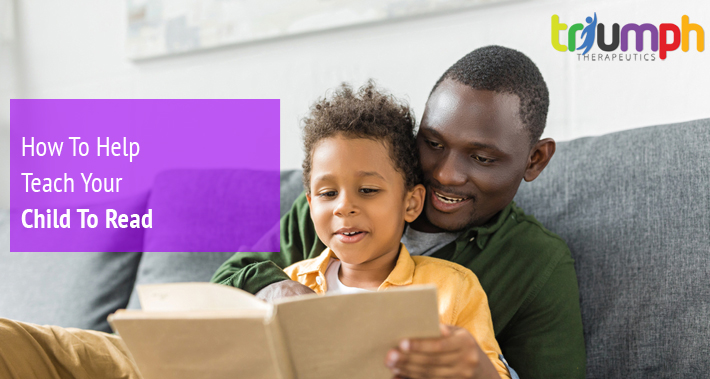How To Help Teach Your Child To Read
https://www.triumphtherapeutics.com/wp-content/uploads/2022/06/Triumph-Therapeutics-Speech-Therapy-OT-Physcial-Therapist-Washington-DC-Jun02-01-2022.jpg 710 379 Triumph Therapeutics Triumph Therapeutics https://www.triumphtherapeutics.com/wp-content/uploads/2022/06/Triumph-Therapeutics-Speech-Therapy-OT-Physcial-Therapist-Washington-DC-Jun02-01-2022.jpgWhen it comes to skills which can greatly improve your life, reading is very high on the list.
Beyond the basics of being important for success in school, reading can help boost communication skills, expands vocabulary, stimulates brain activity, helps to improve focus and concentration and much, much more.
Some children are voracious readers from a young age – they seem to pick up the skill quickly and easily and devour every book they can get their hands on.
Others may need a little more help in this area, and if your child is experiencing delays it may have you on Google searching for “pediatric speech therapy near me” to determine if there are any issues which need to be addressed.
You might be surprised to learn that a speech therapist can help with reading, since speech therapists are usually thought of in terms of speech disorders.
Things like traumatic brain injury speech issues, selective mutism, dysarthria, childhood apraxia of speech, or tongue tie.
However, the full name is not speech therapist, but speech language pathologist – which means they can help with all facets of language related issues.
That includes reading issues which may arise from dyslexia, developmental delays, learning disabilities, and more.
Today we’re going to look at some tips for helping your child learn to read, and when to seek additional help if they don’t seem to be progressing at the rate you might expect them to.
Keep reading to learn more.
First, Understand What You’re Actually Teaching Them
When you’re an adult who has been reading your whole life, you might not give too much thought to the basic skills required for reading.
However, in order to successfully teach your child to read, you need to get back to basics and understand the five skills which are essential for reading success.
These skills are:
- Fluency – being able to read out loud with understanding and accuracy
- Phonemic awareness – hearing and manipulation the various sounds in words
- Vocabulary – knowing the meanings and context of words
- Phonics – awareness of the sounds letters make and the connections between letters
- Reading comprehension – being able to understand what the text means, both in the context of informational books and in storybooks
Read With Your Child – And Keep Them Engaged
One of the best ways to help your child develop a love of reading is to model the skill by reading to, and with, them.
By reading with them, you’re helping to build their vocabulary, providing an example of reading fluency, and building skills needed for comprehension.
Keep your child engaged in the material by asking questions about the pictures for younger children.
Questions like “what color is the cat?” or “how many cars are there on the street?” or questions about the text for older children, such as how the story makes them feel, or how they think the protagonist feels can help them to feel more involved in the story.
Use Flash Cards
Some words can be harder to sound out than others, and many of these occur quite often in reading and writing, some examples being “you”, “had”, “they”, “where”, “we” and “does”.
These are words which will need to be recognized on sight in order to make the processing of reading and writing smoother.
An easy way to help your child learn to learn and recognize these “sight words” is to make flash cards of them to practice.
Use Letter Fridge Magnets
Using fridge magnets shaped like letters can be a fun way to teach your child simple words, and also to distinguish consonants from vowels.
Separate the vowels to one side, and have your child spell out simple constant – vowel – consonant words (like “cat” or “hop”).
This will help them learn to distinguish middle vowel sounds, and learn to spell basic words.
Use Songs And Rhymes
Children’s rhyme and songs are more than just a fun way to connect with your child – they can also be a way to build phonemic awareness.
Phonemic awareness refers to the ability to recognize and focus on specific sounds in spoken words.
The rhythm and rhymes in kids’ songs can be used to help them hear sounds and syllables in words, which is important for learning to read.
Play Word Games With Them
Word games can get your child to go beyond just recognizing words and letters on a page.
These games can motivate them to listen carefully, and then identify them and manipulate sounds in words.
Questions to consider asking your child could include:
- “Tell me what rhymes with ______?”
- “What words start with the sound ____?”
- “Give me an example of a word that starts (or ends) with the sound ___?”
Patience Is A Virtue
One of the most important things to remember as you’re teaching your child to read is everyone will learn at their own pace.
Furthermore, if you place too much pressure on your child, they may become stressed out and nervous which could hinder their progress.
Try to alternate between letting your child pick out the books which interest them and activities which you choose to help practice the different skills needed for reading – this keeps things enjoyable while also reinforcing the skills they need to develop.
What Happens If They’re Not Progressing?
Sometimes, despite your best efforts, some children won’t progress at the expected rate.
If your child is not reaching expected developmental milestones, it could be an indicator of a developmental delay.
Speech and language disorders refer to issues related to speaking or understanding the meaning of sounds and gestures.
By comparing your child’s progress to standard speech and language milestones such as:
- Speaking in short sentences by age 3
- Being able to say nursery rhymes and tell basic stories by age 4
- Using the past tense, saying their first and last name, and following simple, two part, commands by age 5
If you notice any of these issues with your child, then it’s time to…
Book Your Appointment With Triumph Therapeutics Today
Is your child not progressing at the same rate as their peers when it comes to learning to read?
Are they failing to meet developmental milestones in relation to speech and language?
Have they not developed the vocabulary you would have expected at their current stage?
We’re Triumph Therapeutics, serving Washington DC and the surrounding areas, and we can help.
Book an appointment today, to meet with one of our speech language therapists, and learn about how we can help your child learn to read, so they will be able to experience the joy of books for the rest of their life.


